#lisa simpson presentation
Text
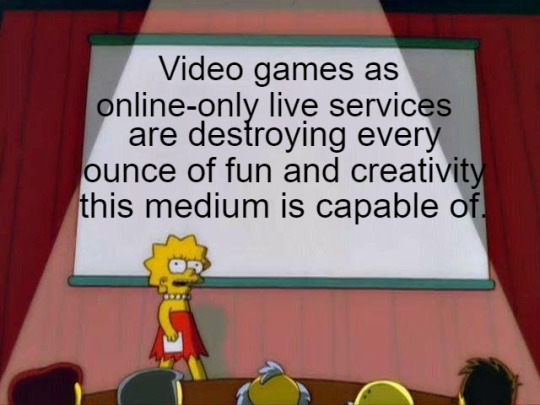
Lisa Simpson's sideshow presentation: "Video games as online-only live services are destroying every ounce of fun and creativity this medium is capable of."
#video games#gaming#games as a service stinks#anti-games as a service#games as a service is ruining games#lisa simpson#lisa simpson presentation#the simpsons#simpsons#simpsons meme#anti-gaas#anti capitalism#capitalism is a scam#capitalism ruins everything#late stage capitalism
2K notes
·
View notes
Text
Springbear is just Willry with 80% less tragedy involved
#Imagine me doing the lisa simpson presentation meme with this#Springbear#willry#fnaf#being cringe on main
40 notes
·
View notes
Photo
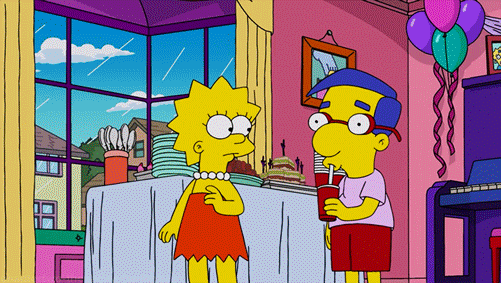
#gif#the simpsons#lisa simpson#milhouse van houten#lisa's birthday#best birthday ever#favorite present
289 notes
·
View notes
Text
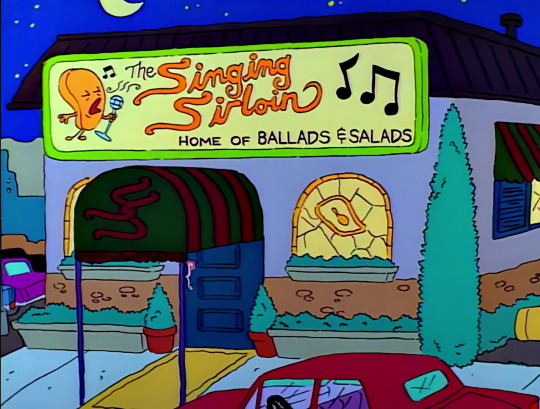




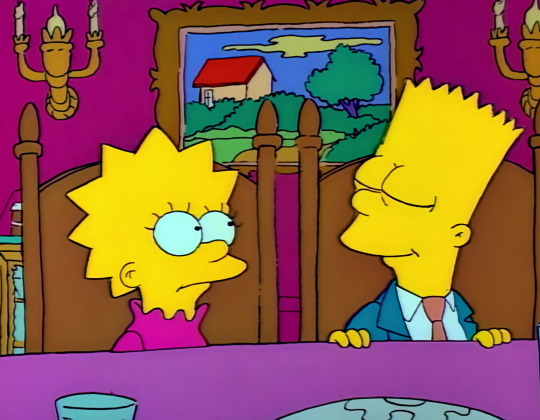
t h e s i m p s o n s, 1989 - 📺 created by matt groening [life on the fast lane, s1ep9] 'Bart's Perfume Present'
#animated sitcom#the simpsons#matt groening#the simpsons season 1#Life on the Fast Lane#homer simpson#marge simpson#bart simpson#lisa simpson#maggie simpson#patty bouvier#Bart's Perfume Present
3 notes
·
View notes
Text

So I recently randomly remembered The Raccoons and how much preteen me loved how the dude went from cliché corrupt villainous CEO character to little by little, smoothly and realistically one of the wisest and most complex characters ultimately softening and opening up without becoming perfect either
#cyril sneer#kids#tv show#animation#lisa simpson giving a presentation#meme#i made it myself#lol#the raccoons#moi#zuko#avatar the last airbender
18 notes
·
View notes
Text

I made my own Lisa Simpson's Presentation meme cause frankly most of my thoughts are presented to me like this anyway
2 notes
·
View notes
Text

“Kate was criticized less by the press because she didn't come with a 'self-righteous' attitude acting like she was better than anyone else or preaching people what was wrong or right. If you come across as 'know-it-all' Lisa Simpson don't complain if mass media will judge you even for eating avocados. If you present yourself as an environmentalist it is obvious that the public will call you out if you take multiple jets to go on holiday. Meghan didn't have enough credibility to impose herself like this, even Diana started her social battles only after years of public service having earned the respect of the public . Meghan couldn't handle the media attention or being called out for her impocrisy.” - Submitted by Anonymous
43 notes
·
View notes
Text
Being in a relationship with an intelligent reader

🄻🄸🅂🄰 🅂🄸🄼🄿🅂🄾🄽
☆ Lisa Simpson's intellect and insatiable curiosity for knowledge create a profound connection with a smart reader. Their relationship transcends superficial interactions, delving into the depths of intellectual exploration and mutual growth.
☆ Engaging in deep conversations becomes a regular occurrence for Lisa and the smart reader. They eagerly share insights, challenge each other's perspectives, and dissect complex topics with analytical precision. Through these discussions, their minds intertwine, fostering a profound understanding of one another's intellectual capacities and fostering a bond grounded in intellectual stimulation.
☆ The smart reader's intelligence serves as a wellspring of inspiration for Lisa. Witnessing their insatiable thirst for knowledge and unyielding pursuit of intellectual growth, Lisa finds herself propelled to explore new areas of interest and expand her own intellectual horizons. They become catalysts for each other's intellectual evolution, embarking on a shared journey of intellectual discovery.
☆ Their shared love for learning becomes a cornerstone of their relationship. Hours melt away as they delve into discussions about books, literature, scientific breakthroughs, and philosophical musings. They eagerly exchange recommendations, diving into literary works and scientific papers, enriching their understanding of the world and broadening their intellectual scope.
☆ As the smart reader's presence seeps into Lisa's life, it ignites a burning motivation within her to pursue her academic and intellectual goals with renewed vigor. Encouraged by the unwavering support and intellectual companionship, she sets her sights on achieving new heights of knowledge and academic excellence.
☆ Beyond intellectual pursuits, their bond flourishes in the realms of shared experiences and emotional connection. They embark on adventures together, attending lectures, visiting museums, and engaging in cultural events that fuel their thirst for knowledge. These experiences not only deepen their intellectual connection but also create lasting memories that solidify their relationship.
☆ In this intellectually charged and nurturing environment, Lisa finds solace and inspiration. The smart reader becomes her confidant, mentor, and ally, consistently pushing her to explore her intellectual potential. Together, they navigate the intricacies of life, relying on the shared values of curiosity, critical thinking, and a passion for knowledge to navigate the world with an insatiable hunger for growth.
☆ In this ever-evolving relationship, Lisa and the smart reader become kindred spirits, supporting each other's intellectual endeavors and celebrating the unique bond they share. Their connection fosters a deep sense of fulfillment, as they continuously inspire one another, push the boundaries of their intellectual capacities, and embark on a lifelong journey of learning and personal development.

🄱🄰🅁🅃 🅂🄸🄼🄿🅂🄾🄽
☆ Bart Simpson's mischievous and adventurous spirit finds a delightful counterpart in the wit and intellect of a smart reader. Their relationship is characterized by a harmonious blend of playful banter, intellectual challenges, and an ever-present sense of intrigue.
☆ The smart reader's intelligence acts as a guiding force for Bart, offering him a fresh perspective on his mischievous tendencies. Instead of purely engaging in pranks for the sake of causing chaos, the smart reader encourages Bart to channel his creativity and intelligence into more constructive endeavors. They introduce him to the concept of using his mischievous nature to solve puzzles, create clever inventions, and devise ingenious strategies that stimulate his intellect while still keeping him entertained.
☆ Together, Bart and the smart reader embark on a journey of intellectual exploration. They immerse themselves in a wide range of subjects, from history and science to philosophy and the arts. They delve into books, engaging in animated discussions about literary classics and contemporary works. They unravel the mysteries of the universe through scientific experiments and explore the depths of human nature through philosophical debates. In this process, Bart discovers new interests, expands his horizons, and nurtures his intellectual growth, all while sharing the joy of learning with the smart reader.
☆ The smart reader's presence in Bart's life serves as a constant source of inspiration. They challenge him to think more critically, to question the status quo, and to appreciate the value of knowledge. Through their discussions and intellectual exchanges, Bart develops a deeper appreciation for the power of intellect and the importance of expanding his intellectual horizons. The smart reader becomes a mentor figure, nurturing Bart's innate curiosity and providing guidance as he navigates the complexities of the world.
☆ Beyond their intellectual pursuits, Bart and the smart reader form a unique bond based on mutual respect and admiration. They engage in friendly debates, trading witty remarks and clever retorts, each sharpening the other's intellect in the process. Their interactions are not only intellectually stimulating but also foster a genuine camaraderie and understanding, transcending the conventional boundaries of age and experience.
☆ In this intellectually charged relationship, Bart's mischievous nature finds an outlet for growth and self-improvement. The smart reader's influence instills in him a sense of intellectual curiosity and a desire to continually seek new knowledge. Bart learns to appreciate the beauty of intellect and recognizes the transformative power of intellectual stimulation in his own personal development.
☆ As their connection evolves, Bart and the smart reader become partners in intellectual exploration and personal growth. They embark on intellectual challenges together, solving complex puzzles, brainstorming creative ideas, and engaging in stimulating activities that nurture Bart's intellect. In this collaborative environment, Bart's mischievous nature finds purpose and direction, merging his natural inclination for adventure with the pursuit of intellectual excellence.
☆ In conclusion, being in a relationship with a smart reader enriches Bart's life, offering him a unique blend of intellectual stimulation, personal growth, and a shared sense of adventure. Their playful banter, intellectual challenges, and shared pursuit of knowledge create a bond that transcends conventional expectations. Bart's mischievous nature flourishes under the guidance of the smart reader, as they inspire him to explore new intellectual frontiers, appreciate the value of knowledge, and embark on a lifelong journey of intellectual curiosity and self-discovery.

🄷🄾🄼🄴🅁 🅂🄸🄼🄿🅂🄾🄽
☆ Homer Simpson's adolescent self, known for his carefree nature and initially contrasting intellect, would find a newfound appreciation for the intelligence and wisdom of a smart reader. Their relationship would transcend the initial disparities, evolving into a dynamic partnership characterized by mutual understanding, personal growth, and shared experiences.
☆ At first, Homer may feel a sense of awe and admiration for the smart reader's intellectual prowess. He would be captivated by their insights, recognizing the value of their knowledge and seeking their advice on various matters. The smart reader, in turn, would approach their interactions with patience and understanding, recognizing Homer's unique perspective and finding ways to bridge the gap between their intellectual differences.
☆ Through their intellectual discussions and shared experiences, Homer and the smart reader would discover common ground that extends beyond their initial disparities. They might engage in hobbies or pursue shared interests, such as attending sports events, exploring nature, or even engaging in do-it-yourself projects that merge intellect with hands-on skills. These shared experiences would strengthen their connection, allowing them to appreciate and celebrate their differences while also fostering personal growth and mutual understanding.
☆ The smart reader's presence in Homer's life would serve as a catalyst for his intellectual and personal development. Their intelligence and wisdom would inspire Homer to expand his horizons, embrace new ideas, and challenge his own preconceptions. The smart reader's influence would gradually transform Homer's mindset, encouraging him to approach problems from different angles and think more critically about the world around him.
☆ In this evolving relationship, Homer would not only gain intellectual insights but also learn valuable life lessons from the smart reader. Their guidance would instill in him a sense of curiosity and a desire to continually learn and improve. Homer's adolescent self would gradually embrace new ideas and perspectives, developing a more open-minded approach to life.
☆ As their connection deepens, Homer and the smart reader would continue to support and inspire one another. The smart reader's presence would encourage Homer to pursue personal goals and strive for self-improvement. They would provide guidance, motivation, and intellectual stimulation, helping Homer realize his potential and find fulfillment in his own unique way.
☆ In conclusion, a relationship between Homer Simpson's adolescent self and a smart reader would go beyond initial intellectual disparities, creating a space for understanding, personal growth, and shared experiences. Through their interactions, Homer would gain a newfound appreciation for intelligence, expanding his horizons and embracing new ideas. The smart reader's guidance and intellectual influence would play a pivotal role in shaping Homer's mindset and fostering personal development. Together, they would forge a lasting connection that transcends their initial differences, celebrating the power of intellectual curiosity and mutual support.

🄼🄰🅁🄶🄴 🄱🄾🅄🅅🄸🄴🅁
☆ Marge Simpson's adolescent self, known for her caring and nice nature, would create a supportive and intellectually stimulating environment for a smart reader to flourish. Their relationship would be characterized by genuine interest, deep conversations, and shared intellectual pursuits, fostering mutual growth and personal development.
☆ Marge's inherent kindness and empathy would provide a safe space for the smart reader to express their intelligence and share their intellectual pursuits. She would offer a listening ear, genuinely appreciating and valuing their ideas and insights. Marge's unwavering support would fuel the smart reader's confidence, encouraging them to freely express their intellectual thoughts and contribute to meaningful conversations.
☆ The presence of a smart reader in Marge's life would inspire her to explore new realms of knowledge and expand her understanding of the world. Engaging in deep conversations about various topics, they would exchange ideas, challenge each other's perspectives, and broaden their intellectual horizons. The smart reader's intelligence would serve as a catalyst, igniting Marge's curiosity and motivating her to seek intellectual growth alongside them.
☆ In their relationship, Marge would actively support and encourage the smart reader's intellectual pursuits. She would cheer them on, recognizing the value of their intelligence and the importance of their contributions. Marge's nurturing nature would create a nurturing environment for the smart reader's intellect to flourish, fostering a sense of validation and enabling them to freely explore and express their intellectual thoughts and ideas.
☆ Together, Marge and the smart reader would embark on intellectual journeys. They might attend educational workshops, engage in collaborative projects, or explore various intellectual pursuits that pique their interest. These shared experiences would deepen their connection and create opportunities for continuous intellectual development. By immersing themselves in stimulating activities, they would foster personal growth and inspire each other to reach new heights of knowledge and understanding.
☆ As Marge and the smart reader engage in intellectual exploration, their bond would strengthen. They would develop a profound understanding and appreciation for one another's intellectual capacities, nurturing a deep sense of mutual respect and admiration. Marge's genuine interest in the smart reader's intellect would fuel their motivation to pursue intellectual endeavors, while the smart reader's intelligence and insights would enrich Marge's understanding of the world, encouraging her to think critically and embrace new intellectual challenges.
☆ In conclusion, the relationship between Marge Simpson's adolescent self and a smart reader would create a and intellectually stimulating environment. Marge's caring nature would provide the perfect support system for the smart reader's intelligence to flourish, while their intellectual pursuits would inspire Marge to explore new realms of knowledge. Together, they would engage in deep conversations, embark on intellectual journeys, and foster continuous personal growth. Their bond would be rooted in mutual respect, admiration, and a shared passion for intellectual exploration, creating a fulfilling and intellectually enriching partnership.
#the simpsons x reader#lisa simpson x reader#bart simpson x reader#homer simpson x reader#marge bouvier x reader#marge simpson x reader
29 notes
·
View notes
Text
Round 1 of 8, Group 3 of 8


propaganda and summaries are under the cut (May include spoilers)
Boy Meets World: 5.18 If You Can't Be with the One You Love
cw for underage drinking
In an effort to numb his heartache, Cory steals a bottle of whiskey from Alan. He offers to share the bottle with Shawn and the two drown their sorrows. Trouble arises when Shawn discovers he likes the alcohol a little too much.
"i always thought that topanga was the one person i couldn't live without. but she's gone, and, and you're here, and i'm alive, so it must be you!"
while the queer and romantic undertones of shawn and cory's relationship have always been present in the show, until this point, the fact that they're very obviously in love tended to be played for laughs. in this episode, for the first time, there's a direct acknowledgement of the fact that their relationship isn't just any old friendship. for the time, cory explicitly says that shawn is more important to him than topanga, that shawn is the reason he can keep living. i fully believe that this episode changed the trajectory of boy meets world permanently. sure, there was 'chick like me', where cory was pretty obviously ogling shawn in a skirt, and 'an affair to forget', where the running gag was that shawn's girlfriend was taking him away from cory, or even 'it's not you, it's me...' where shawn and cory had an argument that was very much written like a breakup, but those were all for comedy. in this episode, as cory gets drunk for the first time in his life, he confesses to shawn that he is the most important person in his life. in my opinion, this confession is the reason that future episodes could carry on with distinct queer undertones. it makes it visible that in the writer's room for boy meets world there were people who genuinely wanted cory and shawn to end up together. the episode continues to pack punches, revealing alan's perception of shawn as a bad influence on cory. this introduces another arc of shawn falling prey to the same genetic alcoholism that had affected his father. sure it's a fun episode of a fun show where high schoolers get drunk and piss on a cop car, but like an ogre, this episode has layers. backstory for shawn, angela being an icon, and dialogue that changed the relationship between shawn and cory forever, this episode truly has it all.
The Simpsons: 4.17 Last Exit to Springfield
When Mr. Burns revokes the plant's dental plan, forcing Lisa to be fitted with cheap, ugly braces, Homer leads its union into going on strike.
Truly The Simpsons at its best. A small but heartfelt story with some iconic jokes (dental plan/Lisa needs braces; Classical Gas; punching Lenny in the back of the head) Lisa's protest song radicalised me at the age of 10. They have the plant but we have the power <3
22 notes
·
View notes
Text
STATISTICAL "WHICH CHARACTER" PERSONALITY QUIZ
rules: take this test and present who you got as the characters most similar to you.
Obi-Wan Kenobi (Star Wars) 92%
Alfred Pennyworth (Batman) 91%
Ben Hargreeves (The Umbrella Academy) 90%
Riza Hawkeye (Fullmetal Alchemist: Brotherhood) 90%
Minerva McGonagall (Harry Potter) 88%
Carlise Cullen (Twilight) 88%
Dana Scully (The X-Files) 87%
Beverly Katz (Hannibal) 87%
Lisa Simpson (The Simpsons) 86%
Peggy Carter (Marvel Cinematic Universe) 85%
thank you for tagging me @antlerdyke 😘😘😘
tagging: @creaturewoman @heathersapples @queerpuff @nocakesformissedith @antlerqueer @natscatorrcio and whoever else wants to do it this is so much fun ♥️♥️
#i had these written down because i’m obsessed w myself but what ive realized is that IM JUST AN OLD MAN……….#anyways#i couldnt think of anyone else to tag also don’t wanna annoy anyone 😔#IF YOU DO IT THO TAG ME I WANNA SEE WHAT YOU GUYS ARE LIKE ♥️
9 notes
·
View notes
Text
Noelle, trying to convince Diya they should share a place:

[id: the Lisa Presentation meme from the Simpsons, edited to contain Noelle from Butterfly Soup in place of Lisa. The projector screen reads, "The Psychological and Economic Benefits of Cohabitation"
//end id]
Diya, trying to convince Noelle they should share a place:
3:08 PM | Diya: split rent? [link]
#make no mistake this comes after weeks of agonizing and overthinking on both their parts#the thing is is that this activates noelle's Research Brain#diya just loses a few grade points and gets a new PB lap time#butterfly soup#noelle#diya#meme#diyelle
36 notes
·
View notes
Text
Time to pull out the big guns.
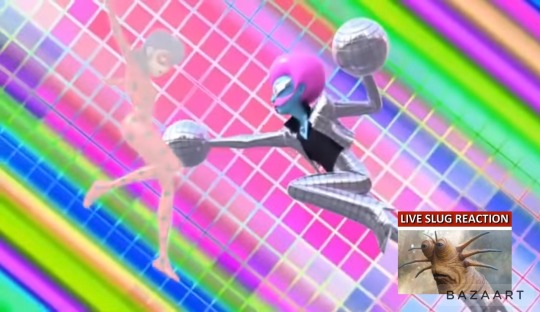
it’s me, boy, I’m the slug, watching as Ladybug doesn’t even stand a chance against the awesome power of Party Crasher.
[image description: screenshot of Party Crasher vanquishing Ladybug, with a live slug reaction image slapped on in the bottom left corner]
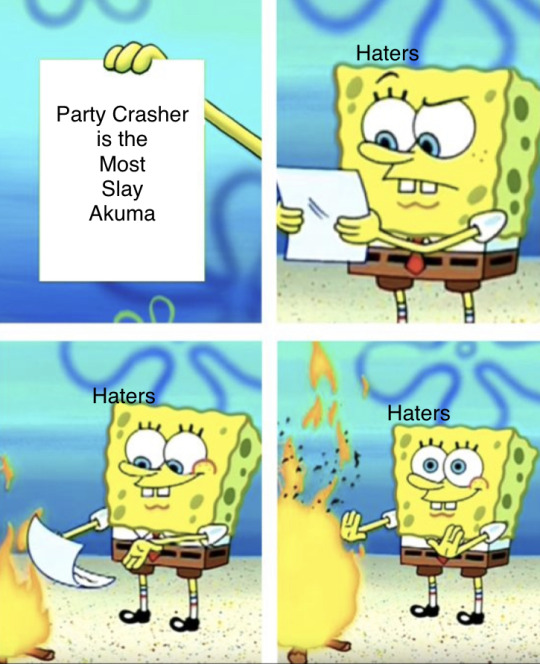
[image description: SpongeBob burning paper meme, edited to say Haters burning a paper that says “Party Crasher is the Most Slay Akuma”]

[image description: infidelity meme; red girl says “Campaigning for Party Crasher to win Most Slay Akuma 2023”; man says “Me”; blue girl says “My responsibilities”]
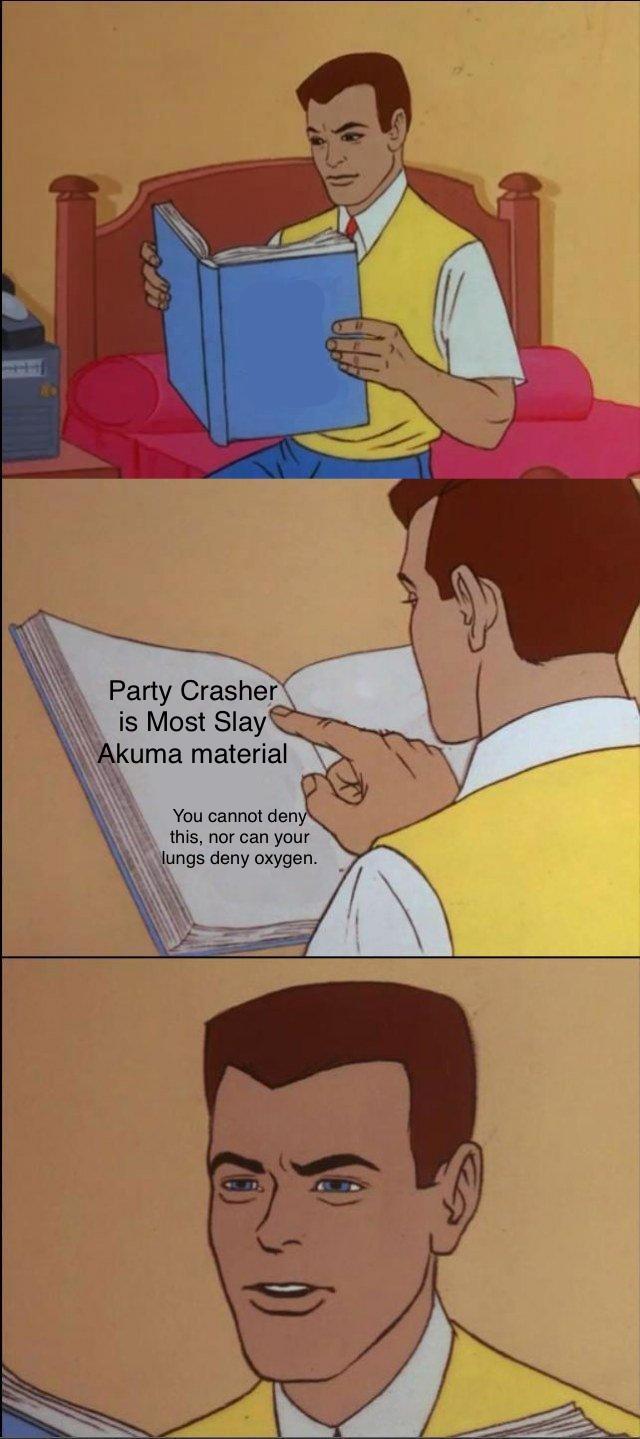
[image description: comic of guy with flat top hair cut and yellow sweater vest reading a book. The book is open to a page edited to say “Party Crasher is Most Slay Akuma material” and “You cannot deny this, nor can your lungs deny oxygen.” Guy looks like he has seen nirvana]

[image description: Pooh vs dapper Pooh; Pooh says “Voting for Heart Hunter as Ugliest Akuma 2023”; dapper Pooh says “Voting for Heart Hunter as Ugliest Akuma 2023 AND Party Crasher as Most Slay Akuma 2023”]

[image description: Lisa Simpson presentation meme edited to say “Party Crasher deserves to be Most Slay Akuma 2023 and if you don’t vote for him you’re a COWARD”]

[image description: side eye monkey puppet meme with caption “Me when people make silly excuses for why anyone other than Party Crasher should be Most Slay Akuma”]
Me waiting for Party Crasher to win Most Slay Akuma 2023:

[image description: Mr. Bean waiting in a field of flowers]

[image description: crying girl vs girl under blanket; crying girl says “Me, advocating for Party Crasher to win Most Slay Akuma 2023”; girl under blanket says “People who follow me for anything other than ML”]

[image description: one of the kids from that ed, edd, and Eddie show or whatever, and they have a book of facts; they open it and point to a page that is edited to say “Party Crasher is, indubitably, THE Most Slay Akuma”]

[image description: someone holding two pics, one edited to show Party Crasher and the other edited to say “Most Slay Akuma,” and saying “Corporate needs you to find the differences between this picture and this picture.” Pam from the Office says “They’re the same picture.”]
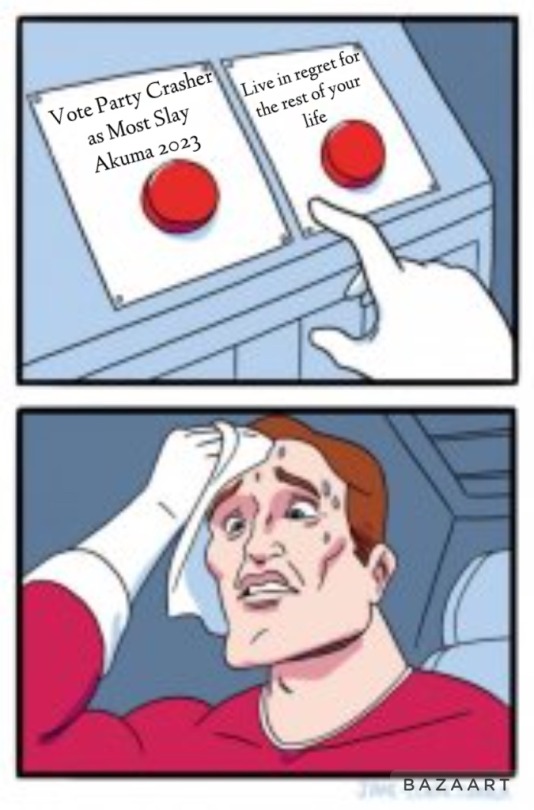
[image description: sweating guy must choose between pressing two buttons; one is edited to say “Vote Party Crasher as Most Slay Akuma 2023” and the other is edited to say “Live in regret for the rest of your life”]

[image description: Gru’s plan meme, edited to say: “I convince everyone to vote for Party Crasher as Most Slay Akuma 2023”; “Party Crasher wins Most Slay Akuma 2023”; “After the poll, everyone forgets how amazing Party Crasher is”; “After the poll, everyone forgets how amazing Party Crasher is” :(]

[image description: guy holding a mug sits at a table with a sign edited to say “Party Crasher deserves to win Most Slay Akuma 2023” and then, unedited, “CHANGE MY MIND”]
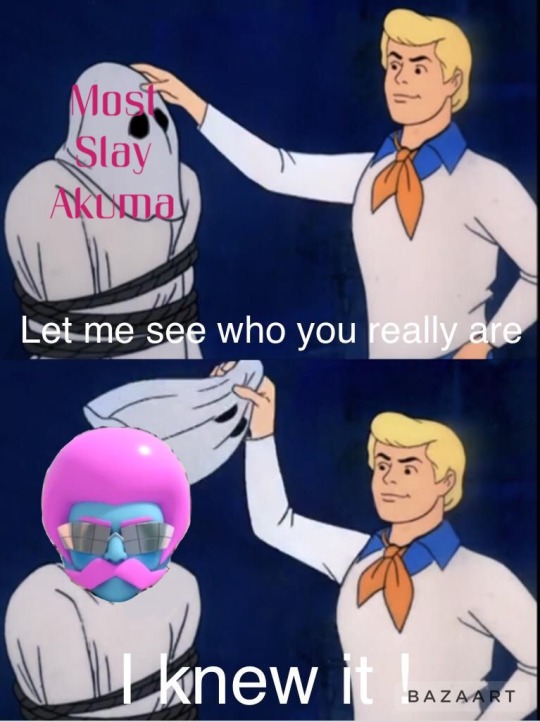
[image description: Fred from Scooby Doo grips top of tied-up villain’s mask, and mask is edited to say “Most Slay Akuma,” Fred says “Let me see who you really are”; Fred unmasks villain, who is edited to have Party Crasher’s face, and Fred says “I knew it !”]
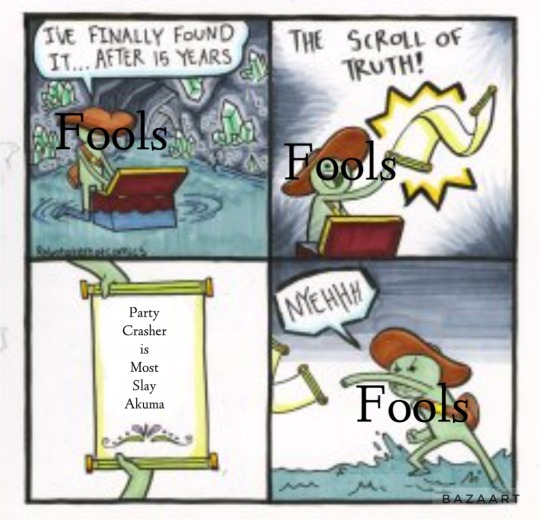
[image description: comic of guy who found the scroll of truth, except guy is edited to be “Fools” and scroll is edited to say “Party Crasher is Most Slay Akuma”]
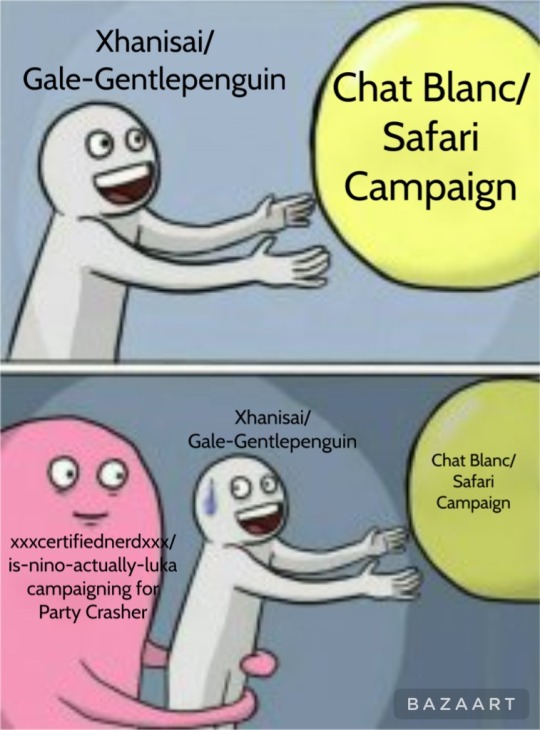
[image description: grey guy is “Xhanisai/Gale-Ganglepenguin” and is reaching out to hold yellow ball labeled “Chat Blanc/Safari Campaign”; grey guy sweats nervously as big pink blob guy, who is “xxxcertifiednerdxxx/is-nino-actually-luka campaigning for Party Crasher,” grabs grey guy around the waist]
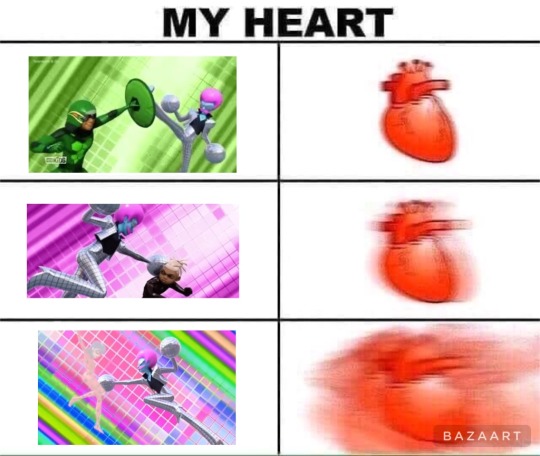
[image description: meme saying my heart goes crazier as images change from Party Crasher attacking Carapace to Party Crasher attacking Pegasus to Party Crasher attacking Ladybug]

[image description: Uno meme, where card says (edited) “Lie and say Party Crasher isn’t Most Slay Akuma 2023” (unedited) “OR draw 25”; guy holding a bunch of cards is labeled as “Me, someone with integrity”]

[image description: was anybody going to tell me guy, edited to say “Okay, was anybody going to tell me that Party Crasher is Most Slay Akuma 2023 or was I just supposed to see Millie’s/Frank’s/xxxcertifiednerdxxx’s spam posting myself?”]
#party crasher#party crasher or death#vote party crasher most slay akuma 2023#party crasher most slay akuma 2023#party crasher is obvi the most slay#lengthy article#ml#ml meme#ml memes#miraculeakless#ml leak free#ml leak safe#mlnl#akuma poll 2023#meme#memes#nerd out#nerd-out
22 notes
·
View notes
Text
And then I go and spoil it all by saying somethin' stupid like, "I love you"
Ship: None / Potential Homer x Keaton, platonic Marge, familial Bart & Lisa
Word Count: 723
Summary: Homer says "I love you" to Keaton for the first time, but it's not exactly within the context he desires. Unlike the Willie fic I posted, Homer x Keaton is canon to my ships hehe. CWs for food mentions.
Tag List: @canongf

Keaton hummed as he rode in the passenger seat of a car belonging to one of the television network’s new interns. In his lap lay two white boxes of fresh Lard Lad doughnuts.
“Thanks for driving me, Levi, you’re sure you won’t be late?”
Levi waved his hand dismissively. “Mr. Hooligan, my shift doesn’t start for another two hours, don’t be such a worrywart!” The young man smiled, casual and teasing. “Besides, it’s the least I can do for you after you convinced those execs to give me a chance.”
“It was no trouble, really. Ah, here we are, you can just pull up to the curb. Give Krusty my best if you see him and Mel my apologies for making him fill in for me today.” Keaton smiled apologetically and winked before getting out of the car.
“Bye, Mr. Hooligan!”
As Levi drove off, Keaton turned toward the home of his closest friends, the Simpson family, sighing contentedly as he looked up at the two-story tan and brown brick house. Passing by the garage and following the path up to the door, Keaton shifted the doughnuts to one arm and fished his keys out of his pocket, letting himself inside. Whistling as he closed the door, he set off for the kitchen.
“Morning, Marge!”
Marge, the matriarch of the Simpsons family, turned away from the coffee pot, smiling. “Oh! Keaton, you didn’t say you were coming over this morning.”
“I wanted to surprise the kids,” he set down the boxes. “Freshest these babies could possibly be, I put in an order before they were even open.”
“Doesn’t that seem a little unfair to the workers?”
“Hey, I paid them far more than what these pastries are worth, don’t you worry about that. I don’t know, I think as a local celebrity I can get away with doing this sparingly, y’know?” Keaton grinned and gave Marge a quick hug before Homer entered the kitchen, loudly sniffing the air until he reached the counter.
“Oooh! Who brought doughnuts?” He exclaimed gleefully.
“That would be me. Morning, Homer.” Keaton half-waved as Homer turned his attention to him.
“A very good morning to you, Keaton!” Without further stalling, Homer popped open the boxes, marvelling over the twenty-four frosted pastries awaiting him and practically drooling with anticipation. He gasped as he picked one up. “Wow, you even bought creme-filled! I thought you hated creme-filled!”
Keaton bit back a laugh. “Well, they’re not just for me, Homer! But I do call dibs on the double chocolate ones.”
Homer eagerly began eating, picking up a second doughnut as he munched away. “Keaton- homf-mmf -I love you.”
Keaton’s face burned. He knew the words didn’t mean much in this context, other than Homer’s general appreciation, but he couldn’t deny it was something he had begun to want to hear from the man. The crush had appeared sometime after Keaton had been appointed as godfather to Bart, Lisa, and Maggie, Homer and Marge’s children. Of course he had previously noticed the similar stature between Homer and Krusty, but he truly fell in love with him when he saw how he interacted with his kids. Homer wasn’t the brightest man Keaton had met, but at the end of the day he had real heart and always wanted to do best by his kids, and as Keaton grew close with the kids himself, he completely and utterly admired that.
Shaking himself back into the present, Keaton selected his own doughnut as Bart and Lisa joined the trio of adults in the kitchen. “Morning, kids.”
“Morning, K,” Lisa called happily.
“Sweet, doughnuts!” Bart exclaimed.
“Bart, say hello to your godfather,” Marge insisted.
“Hey, K.”
“Hey, little man.” Keaton ruffled the boy’s hair as Bart grabbed three doughnuts.
“What’s with the red face?”
“Oh-! Uhm…”
“Bart, you can’t just ask him things like that!” Lisa shook her head as she picked out her own doughnut. “Besides, it was probably something romantic Krusty said to him before he left for work. Right, K?”
“Gross, no way!”
“Hah, yeah… sure-sure was, Lis. You know him,” Keaton rested his cheek in his palm. “Ever the charmer.” Meanwhile, his mind was preoccupied with the idea of getting kissed by both Homer and Krusty. Desperate not to be questioned further, he busied himself with getting some water from the fridge.
#self shipping#self shipping community#self insert#self insert x canon#self x canon#self insert oc#oc x canon#simpsons oc#circus scripts#🟨The Simpsons🟨#💛🏘️.s/i
16 notes
·
View notes
Text
I was tagged by @movrings
Tagging @deardarlingthings @mexicangela @mtfunkzoo @roamwithahungryheart @existential-labrador and anyone else who wants to do it. No pressure!
Take this test https://openpsychometrics.org/tests/characters/ and present yourself with who you got:
I definitely did this three times 😂
These are the (first 20) results of the recommended:
1. Eliza Hamilton (Hamilton): 93%
2. Valentine Wiggin (Ender's Game): 93%
3. Pam Beesly (The Office): 92%
4. Belle French (Once Upon a Time): 92%
5. Dana Polk (The Cabin in the Woods): 91%
6. Andrea Sachs (The Devil Wears Prada): 91%
7. Anastasia Steele (Fifty Shades of Grey): 91%
8. Mia Dolan (La La Land): 91%
9. Georgiana Darcy (Pride and Prejudice): 90% (awww cute!)
10. Sun-Hwa Kwon (LOST): 90%
11. Ariadne (Inception): 90%
12. Rosalind Walker (Chilling Adventures of Sabrina): 90%
13. Mary Margaret Blanchard (Once Upon a Time): 90%
14. Penny (Dr. Horrible's Sing-Along Blog): 90%
15. Jane Villanueva (Jane the Virgin): 90% (yeah!)
16. Lexi Howard (Euphoria): 90% (honestly so me lol)
17. Nina Locke (Locke & Key): 90%
18. Rita Hanson (Groundhog Day): 90%
19. Egwene al'Vere (Wheel of Time): 90%
20. Beth March (Little Women): 89% (I’m definitely Beth)
The (first 20) results of the quick version:
1. Jane Villanueva (Jane the Virgin): 99% (okay fair haha)
2. Mary Margaret Blanchard (Once Upon a Time): 96%
3. Hazel Grace Lancaster (The Fault in Our Stars): 96%
4. Prairie Johnson (The OA): 96%
5. Lexi Howard (Euphoria): 95%
6. Pam Beesly (The Office): 94%
7. Katara (Avatar: The Last Airbender): 94%
8. Belle French (Once Upon a Time): 94%
9. Mia Dolan (La La Land): 94%
10. Nina Locke (Locke & Key): 94%
11. Rita Hanson (Groundhog Day): 94%
12. Egwene al'Vere (Wheel of Time): 94%
13. Marge Simpson (The Simpsons): 93% (okaaay…I’m definitely more Lisa lol)
14. Ariadne (Inception): 93%
15. Kate Pearson (This Is Us): 93%
16. Bonnie Bennett (The Vampire Diaries): 93%
17. Eliza Hamilton (Hamilton): 93%
18. Penny (Dr. Horrible's Sing-Along Blog): 93%
19. Manny Delgado (Modern Family): 93%
20. Jane Eyre (Jane Eyre): 93%
And the (first 20) results of the exhaustive version:
1. Emma Pillsbury (Glee): 85% (again, fair)
2. Amy Antsler (Booksmart): 84%
3. Anita 'Needy' Lesnicki (Jennifer's Body): 84%
4. Chidi Anagonye (The Good Place): 83%
5. Clare Edwards (Degrassi: The Next Generation): 83%
6. Bruce Banner (Marvel Cinematic Universe): 82%
7. Lexi Howard (Euphoria): 82% (Lexi in the top ten all three times. A pattern)
8. Nick Carraway (The Great Gatsby): 81%
9. Linus Caldwell (Ocean's 11): 81%
10. Columbus (Zombieland): 81%
11. Nina Sayers (Black Swan): 81%
12. Charlie Kelmeckis (The Perks of Being a Wallflower): 81%
13. Drew Baylor (Elizabethtown): 81%
14. Hazel Grace Lancaster (The Fault in Our Stars): 81%
15. Evan (Superbad): 80%
16. Matt Saracen (Friday Night Lights): 80%
17. Timothy McGee (NCIS): 80%
18. Randall Pearson (This Is Us): 80%
19. Konstantin 'Kostya' Levin (Anna Karenina): 80%
20. Vanya Hargreeves (The Umbrella Academy): 80%
6 notes
·
View notes
Text
Is liking Ayn Rand a personality defect? Before she was the godmother of American libertarianism, Rand was a writer known for insisting on the virtue and beauty of self-interest. To her admirers, her books, including “The Fountainhead” and “Atlas Shrugged,” celebrate exceptional men and women who make their own flourishing a moral imperative. To her detractors, Rand’s novels, as Lisa Duggan writes in her 2019 study “Mean Girl: Ayn Rand and the Culture of Greed,” glamorize rapacity and violence; they grant happy endings to characters who showcase “contempt for lesser beings and a cool indifference to their suffering”; and they “provide a structure of feeling—optimistic cruelty—that . . . underwrites the form of capitalism on steroids that dominates the present.”
Since Rand’s death, in 1982, she has been embraced by tech billionaires (Peter Thiel, Steve Jobs, Elon Musk), free-market politicians (Ronald Reagan, Clarence Thomas, Rand Paul), and their acolytes. Elsewhere, she has become a pop-cultural bogeyman, ridiculous but unkillable. Find her on “The Simpsons” (“Russian weirdo Ayn Rand”), “Parks and Recreation” (“a terrible writer”), “Girls,” “Watchmen,” and “The Mindy Project,” invariably dressed as a menace or a punch line. The presence of “Atlas Shrugged” or “The Fountainhead” on a bedside table or Tinder profile is a waving red flag—reliable shorthand for latent sociopathy. A friend, in order to lend me a copy of “Atlas Shrugged” for this piece, stowed the paperback in a manila folder that she then stapled shut and handed off to my partner at their mutual workplace. He smuggled it down the hall and into his bag. “I didn’t think I’d get fired” if anyone saw the book, he explained, “but it wouldn’t look great.”
In “The Book of Ayn,” a novel by Lexi Freiman, Rand takes on a new role: North Star for the cancelled. Anna, a mid-career writer who comes from money, has just published a “contrarian” novel about the opioid epidemic, a satire of the rural poor full of “bad haircuts,” “misspelled tattoos,” and pants-shitting. “I had honestly believed I was writing a book so good it metabolized its own badness,” Anna explains, somewhat touchingly. Instead of the acclaim she expects, Anna gets dropped by her publisher and ghosted by her friends; even her old prep school rejects a last-ditch job application. On Twitter, she is enjoined to jump off the balcony of her pied-à-terre on Madison Avenue and to use her novel as a parachute.
Worst of all, a review in the New York Times suggests that Anna is that current-day bête noire, a “narcissist.” Devastated, Anna borrows a friend’s book on narcissism and reads that narcissists are “selfish, arrogant, and insecure,” “grandiose and fragile and incapable of handling any threat to their identity,” and that they “saw themselves reflected back everywhere, made grand narratives of their lives, but felt at their core that they were empty.”
To Anna’s horror, the descriptions remind her of herself. She is empty, she realizes. She doesn’t believe in anything; all she can do is make fun of people. Seeking a counternarrative, Anna gloms on to a tour group discussing Ayn Rand in a coffee shop and, soon after, orders a bundle of her works. She’s immediately enthralled. The books argue that “selfishness was a form of care” and that “wealth was a beautiful thing.” They claim that “true freedom lived . . . in the breaking of bonds and severing of ties.” As Anna reads, she feels her weaknesses becoming strengths. Her selfishness, she realizes, is radically ethical. She may not get invited to parties anymore, but she wouldn’t enjoy them anyway—she’s too radiantly liberated.
In “The Culture of Narcissism,” his famous 1979 study, Christopher Lasch writes that the narcissist can only overcome insecurity “by seeing his ‘grandiose self’ reflected in the attentions of others.” Freiman slyly casts Rand as Anna’s “grandiose self,” the mask she pulls on over her pain and vulnerability. Anna, you might say, has suffered a narcissistic injury and is turning to Rand to preserve her positive self-image.
An elderly millennial in the shitposting era, Anna shrouds her new obsession in layers of self-protective irony. Rand’s ideas give her solace, and being a “ ‘Randgirl,’ ” in scare quotes, appeals to her contrarianism, her desire to provoke and outrage the commenters who want her to jump off a balcony. When Rand was in her late thirties, she moved from New York to Hollywood to write for the big screen. Anna decides to follow in her footsteps. She decamps for Los Angeles and reinvents herself as a television writer, pitching a sitcom, inspired by “Bojack Horseman” (although she swears it’s not), about a farm animal named Ayn Ram. Even as Anna hopes to rehabilitate her hero for a contemporary audience, she places some distance between herself and her subject by wrapping Rand in the soft wool of humor—a defense mechanism that Freiman suggests originates in a tragedy in her early life. When Anna was three, her infant brother died “for no reason” in his sleep. Provocation “smoothed the edges,” she says, a fleece that muffled the sharpness of loss.
With its undercurrent of childhood trauma, “The Book of Ayn” evokes Mary Gaitskill’s classic treatment of the Randgirl plot, “Two Girls, Fat and Thin,” from 1991. That book’s narrator, Dorothy, imprints on a Rand-like character named Anna Granite after being abused and molested by her father as a teen-ager. “By the time I was seventeen, I had a very negative view of life, and a horrific view of sex,” Dorothy tells Justine, a journalist writing an article on Granite and her fans. When she discovered Granite’s books, Dorothy says, “suddenly a whole different way of looking at life was presented to me.” Ostracized at school, she draws comfort from Granite’s depictions of “proud outcasts . . . surrounded by the cold glow of their genius and grace.” In bed with her father, she clings to a dream of “strong, contemptuous beauty . . . indifferent to anything but itself and its own growth.” Dorothy comes to believe in a philosophy called Definitism—Gaitskill’s thinly veiled version of Objectivism, the doctrine developed by Rand—and it confers on Dorothy the power and value that she believes herself to lack; Granite herself seems to nurture the girl in loco parentis. As a college student, Dorothy buys an interstate bus ticket to attend one of Granite’s speaking events and imagines her idol, how “she would look at me and know everything I’d endured.” At the lecture, she weeps uncontrollably, convinced at last that she is “damn strong,” that she is “worth something.”
“The Book of Ayn” and “Two Girls, Fat and Thin” plead for sympathy for the Randgirl. Like Freiman’s Anna, Gaitskill’s Dorothy is a case study in vulnerable narcissism and, ultimately, a figure of pity. She retreats from the world and into daydreams about Oz and Never-Never Land, epic tales in which she plays the hero. She hides behind delusions of grandeur, raging when Justine asks her “stupid” questions. These are broken people to be handled with gentleness, the novels seem to argue.
But, in fact, both books have a more subversive intent: to trouble the distinction between Randians and everyone else. In “Two Girls, Fat and Thin,” Justine, the freelance journalist who interviews Dorothy, is disgusted by Granite’s ideas. She’s identified as “neurotic” and Dorothy is not; the contrast between them conjures Freud’s dichotomy between pliable patients who obediently adopt the terminology of their analysts and difficult patients who prove too self-absorbed to undergo transference. But Justine, who, unlike Dorothy, is pretty, thin, and popular, incarnates Rand’s notion of the beautiful brute more than Dorothy does. As a girl, she picked on schoolmates who had fewer friends; at one point, transported by “swelling arrogance” and “boiling greed,” she sexually abused a weaker child with a toothbrush. The more Gaitskill reveals about her characters, the more they blur together, as both selfish and selfless at once.
In her penetrating monograph “The Selfishness of Others: An Essay on the Fear of Narcissism,” Kristin Dombek describes a narcissistic behavior called “splitting,” wherein the narcissist idealizes that which soothes him and discards that which causes him pain. “Splitting” is also the main structural mechanism of the two novels—and a mental trap that both their protagonists and their readers must resist. Like “Two Girls,” “The Book of Ayn” is built on a seemingly clean division: Part 1 tells the story of Anna’s intoxication with Rand; in Part 2, Anna, breaking violently with Objectivism, goes to a meditation camp on the Greek island of Lesbos to try to murder her ego. Freiman’s Los Angeles is a cesspit of superficiality and selfishness, but the “Beloveds,” as the cultists who run the retreat in Greece call themselves, aren’t much better. The group’s master is known for his collection of three hundred and fifty Harley Davidsons and for releasing “a vicious strain of European bee into the hostile neighboring farmland.” Other seekers at the commune steal Anna’s clothes, cheat on their partners, and neglect their children. Anna, unconsciously emulating Rand, begins a love affair with a much younger man, a refugee from an unspecified war-torn country. Life on the commune can’t heal the effects of his “hard-core trauma,” he tells her. Only Hollywood can; he longs to “try the acting.”
So is everyone a delusional, self-serving, trauma-masking Randian narcissist at heart? You could call that the lesson of the Randgirl novels, although you’d be underselling their sweetness. The books mock their characters, but they also argue that egoism can be nourishing and even generative. Gaitskill’s treatment of Anna Granite, for instance, is unexpectedly sympathetic. When Dorothy first meets her idol, the older woman models kindness and empathy. Dorothy panics, unable to speak; Granite, Dorothy says, “stood and gripped my shoulders with both hands . . . her eyes radiated the gentlest strength I had ever experienced, her tough, hot, callusy hands supported me with the full intensity of her life.” Granite tells Dorothy that she can see her suffering but also her resilience and value. She offers her a job. Because Granite has willed herself to believe in her own worth, Gaitskill hints, she is alive to the worth in others. And, in awakening Dorothy to her own inner resources, Granite awakens the young woman’s sense of her fellow-humans as sovereign selves. In the hours before Granite’s lecture, Dorothy is transfixed by passing faces: “the jowls, the eye wrinkles, the bumpy noses, the flower-petal quality of young female skin.” When Dorothy was in college, individuals had streamed together into a monolithic threat. But “as I walked among the citizens of Philadelphia,” she says, “I felt as though I occupied a compartment of personal space that they instinctively respected as I respected theirs.”
Freiman finds less to salvage in Rand’s life or work, but the novel is rightly skeptical of the wellness industry’s promises to subdue the demands of selfhood. After failing to make a TV show and then failing to kill her ego, Anna takes stock. She comes to realize that she can’t write without self-esteem—and that writing, more than being a contrarian or even a good person, is her vocation. “There was only one thing that ever helped me,” she says. “One thing that had always been there, strung up at the threshold of my mind like tiny golden lights, enchanting me into life, dangling its whimsy and warm lozenges of hope.” This thing is writing—“only writing promised me happiness, or at the very least progress”—and the type of writing Anna wants to do, voicey and spiky and singular, requires an “I.”
Unlike the self-aggrandizer, the artist, Freiman implies, uses her “I” as an alloy, creating a material both durable and porous, blending what she has felt to be true with what she imagines might be true for others. The writing that Anna intuits will save her dangles at the “threshold” of her mind because it directs her both in and out. Throughout the novel, as she flails around trying to fill her perceived emptiness, what she fills it with are the words, ideas, and lives of roommates, romantic partners, Internet commenters, friends, influencers, yoga instructors, cult members, Antifa activists, and embarrassing conservative philosophers. She reads their books, goes to their events, and stays in their homes. By the end, her “I” has been vastly expanded: other people live in her head, whether she wants them to or not, shaping the innermost contours of her self. This vision of identity as plural means that self-assertion does not necessarily come at the expense of the rest of the world. It could even be a declaration of life on another’s behalf.
Both Freiman and Gaitskill play up the Möbius-strip aspect to selfishness and selflessness—when I stand up for me, they suggest, I am also standing up for you, because we are intertwined. At their most persuasive, though, the Randgirl novels don’t applaud the morality of self-interest so much as they paint self-absorption as a useful but transient phase. Freud characterized narcissism as a form of arrested development. The narcissist, instead of sprouting healthy attachments to others, remains stranded in the oceanic self-involvement of infancy. Gaitskill and Freiman rescue this creature from a state of frozen pathology, returning her to her rightful place within a developmental stage. Dorothy and Anna, perhaps, are just passing through necessary bouts of self-infatuation on their way to maturity. Late in “Two Girls,” Justine comes to appreciate the role that Granite played for Dorothy, even as she believes that Dorothy has outgrown Granite:
When you read Granite’s work not only did she awaken your sense of beauty and pleasure in life, not only did she illustrate for you a positive use of strength and power, but she provided a springboard for you to create an internal world richer and stronger than the external world which wasn’t giving you any support at all. But she was only the departure point.
Instead of a bogeyman or a red flag, maybe Rand is just a set of training wheels, or a trellis on which characters can temporarily support their unfurling selves. “Everybody had a moment of loving Ayn Rand,” Anna’s mother tells her—it’s a low point for our Randgirl, but a reassurance to readers, who are happy to welcome this lost sheep back into the herd. ♦
6 notes
·
View notes
Text
physically unable to express an opinion or stance on any topic unless i present it through that reddit lisa simpson presentation meme format
26 notes
·
View notes